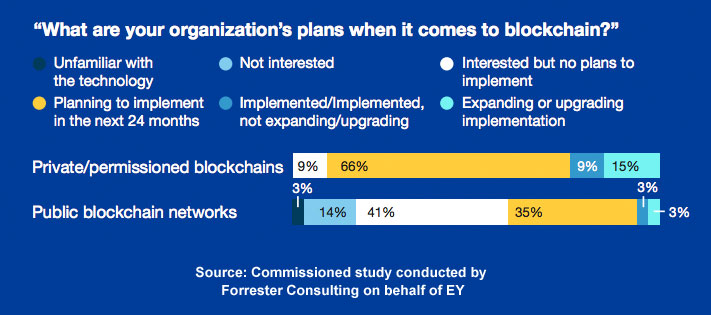Last month, professional services firm Ernst & Young (EY) published a report surveying the adoption of public blockchains by enterprises. EY commissioned Forrester Consulting to sample organizations across the U.S., Europe and Asia.
At present, most enterprises that adopt distributed ledger technology (DLT) are using private blockchains to provide more control and address perceived risks relating to privacy and scalability. The survey found the top three concerns about public blockchains are a lack of maturity (58%), security (53%) and privacy (50%). But if you look at reservations irrespective of public or private, the issues rank as security, privacy and interoperability (45%).
Whether it’s concerns about interoperability or a hope that public blockchains will mature, 75% of the respondents said they are likely to use a public blockchain in future.
All the IT and business decision-makers surveyed worked at firms that employed over 1,000 people. 54% of the 233 participants worked at firms with less than 5,000 staff, with 13% having more than 20,000 employees.
In terms of drivers that made the companies consider blockchain, data integrity was the most significant issue. About 56% of respondents said they adopted blockchain to preserve data integrity, followed by the ability to build new business models (52%) and increased operational efficiency (52%).
Turning to specific use cases as opposed to benefits, the top three were data integrity (64%), supply chain track and trace (55%) and payment support processes (52%).
While private blockchains are currently popular, 35% of the respondents said they are actively planning to implement public blockchain within the next two years, compared to 66% for private blockchains.

Only 1% of firms are a member of a consortium, perhaps related to the average company size, given consortium members are often very large. About 67% of respondents said they started their own network.
The problem with numerous separate networks is they create silos of data. And a key benefit of blockchain is to break down silos and move away from millions of APIs being used to paste together separate databases. Too many blockchain networks reduce that advantage.
While public blockchains mean fewer blockchains, they still have to talk to other blockchains, which is currently a work in progress, as it is with private blockchains. The report did not cover the fact that technical interoperability is just one of the problems. Standards and industry governance are needed for true interoperability, and these aspects transcend the public-private blockchain debate.
The report concludes: “Early blockchain projects are largely reliant on private networks due to a lack of understanding of how public blockchain networks operate, fears of the “Wild West” of cryptocurrencies, and firms’ varying appetites for risk. However, private blockchains bring their own set of problems, particularly around interoperability. ”
EY is actively working on privacy solutions to help enterprises to deploy applications on the public Ethereum network.
Below are recent blockchain surveys:
Accenture: blockchain for aerospace
Boston Consulting Group: blockchain for transport and logistics
Cap Gemini blockchain survey
Deloitte 2019 blockchain survey
Deloitte 2018 blockchain survey
EY blockchain (finance and tech professionals) survey
EY fintech adoption survey
EY APAC blockchain survey
IDC semi-annual enterprise blockchain forecast
IHS Markit survey
KPMG technology industry innovation survey
PwC blockchain survey
PwC China blockchain survey
World Energy Council / PwC blockchain survey
SAP blockchain survey
State Street survey for DLT adoption by asset managers
TD Bank payments industry survey
BNY Mellon payments survey
Friss insurance survey
Juniper enterprise blockchain survey
BIS Central Bank Digital Currency survey
IBM / OMFIF Central Bank Digital Currency survey 2018
IBM / OMFIF Central Bank Digital Currency survey 2019
ING general population cryptocurrency attitudes






